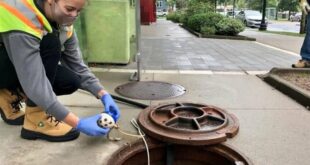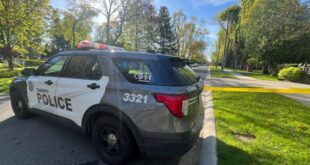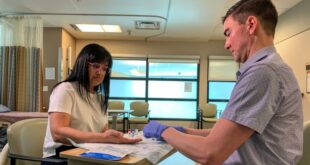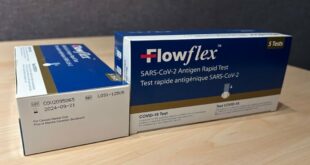Retired RCMP officer tearfully apologizes to daughter of victim at inquest

WARNING: This story contains distressing details.
Vanessa Burns spent years living in fear of Myles Sanderson's brutal violence before he killed 11 people and injured 17 others in a 2022 stabbing massacre in Saskatchewan.
More programming is needed for abusers and their victims, she told a coroner's inquest into the Sept. 4, 2022, mass killing on James Smith Cree Nation on Thursday.
Burns, who was Sanderson's common-law partner for more than a decade, testified about how impossible it was to escape the domestic violence.
The final time he assaulted her was just two days before he went on his rampage, killing many James Smith community members, including Burns's father, Earl. He also attacked and injured her mom, Joyce.
Sanderson, 32, died in custody shortly after police arrested him on Sept. 7, 2022.
Vanessa met him in 2007 when she was 21 and he was 17, she told the inquest in Melfort, Sask. — a small city about 30 kilometres southeast of James Smith Cree Nation.
The inquest is intended to establish what happened in the mass killing and provide recommendations to help prevent similar tragedies from happening in the future.
Burns testified that at first, Myles was charming, funny and "seemed normal," but just a few months into their relationship, he became emotionally and physically abusive.
"He would get angry and violent, and that was his way of making me stop talking," she said.
She reported the abuse to police at least 12 times, and he was charged with assault for multiple incidents, she testified. However, she would decline to pursue the charges for "Myles's sake" because of the guilt she felt, she said.
Sanderson's family members encouraged her to stop calling the police, and Sanderson would sometimes spin the narrative to make it seem like she was "crazy," she said.
Burns also thought she wanted him around for their five children, saying he could be a good father and provider — when he wanted to be.
But the inquest jury heard that Myles didn't spare Burns from his attacks even when she was pregnant. She testified that Sanderson manipulated and controlled her by using the right words and expressing extreme affection or kindness in certain moments.
When he was in prison for violent behaviour, she would visit him often and wrote a letter in support of his parole.
In hindsight, she believes he used her.
"[Abusers] know how to groom their victims. They know their victims' needs … and wants, so they know how to take advantage of that," she said. "I wish I left sooner."
Fight shortly before stabbings
At the time of the stabbings, Sanderson was wanted on a Canada-wide warrant for breaching conditions of his release from prison.
He wasn't supposed to contact Burns, but did.
"I always felt like no matter what I did, this person would always come back," she said. "He always found some way to get into contact with me."
In August 2022, Myles asked Burns to take him to James Smith Cree Nation so he could sell cocaine, she testified. They travelled back and forth between the community and Saskatoon, moving drugs to James Smith members.
"I just wanted to keep the peace with him," Burns said, as she described helping him with sales.
But she soon realized she didn't want that life and confronted him, asking when they were going to stop.
On Sept. 2, 2022, she told him that she was "done" and that they should go home to Saskatoon.
Sanderson exploded with rage. Through tears, Burns said as she was driving, Sanderson's temperament morphed into darkness.
"I could feel like him, like, you know — well you guys don't know — I know how he gets when he's going to start a fight with me," she said, adding he was angry about how she had interacted with another man.
"He was just emotionally abusing me all the way down that road."
She punched him once in the face because he wouldn't stop taunting her, despite her pleas to stop. Sanderson then attacked her, Burns said, smashing her with a scale as she tried to defend herself while driving.
"There were times where I could have rolled [the car]," she said. "Sometimes I wish I did."
Praying to get out alive
Burns drove to the home of Damien Sanderson — Myles's brother, and reportedly the only person who could help calm Myles down.
She got out of the vehicle in the driveway, but Myles followed and continued beating her. She hid behind his mom, who had run out of the house, as he threatened Burns with her vehicle.
Damien began to diffuse the situation.
"I was just praying that I could get out of this alive," Vanessa said.
Once Myles was in Damien's house, Burns made her escape to Saskatoon. Damien told his wife he was going to calm his brother down.
He would later become his brother's first homicide victim.
Meanwhile, Burns hid her bruises with sunglasses, a hat and makeup. She didn't call the police. Instead, she suffered alone, physically and emotionally.
"It was just shitty because I was back in that situation that I had fought so hard to get out of. I felt so mad at myself and I just didn't know what to do, and — I don't know. I was just so mad at myself for trusting him," she said.
"And I still am mad at myself."
She hunkered down and made an escape plan, arranging to bring four of her kids home. One of her boys stayed behind on James Smith Cree Nation with her parents.
When she later learned of the horrors in the community, she was terrified Myles was going to come for her next. She lived in fear until he was apprehended, she said.
"At least you won't be getting beat up anymore," her daughter said after his death.
More domestic violence supports needed
Asked about how similar tragedies could be prevented, Burns said services for victims of domestic violence must be improved.
"I didn't know how to reach out. I didn't know anything about mental health until it was too late," she said.
She had tried to seek help at a shelter with her five children previously, she testified, but left because it was both lonely and crowded.
"I went back to Myles because I had nowhere else to go," said Burns.
She also recommended better programming in the jail system for domestic abusers. Sanderson spent years in and out of custody during their relationship, but his violence never stopped.
She also shared a message for other victims of violence.
"Learn to love yourself as well and love your children, too. That's how it's going to break cycles."
Retired RCMP officer makes tearful apology
The coroner's inquest also included an emotional exchange Thursday morning, when a retired RCMP officer apologized to the Vanessa Burns's sister.
"I am the daughter of Earl Burns," Deborah Burns told retired Staff Sgt. Darren Lee Simons, after he answered her questions about how he responded to the violent attacks.
"I can't imagine your loss, but just know this one's tough on me personally, and I apologize that your father did not get my attention earlier," Simons said to Deborah — one of the family members who has standing in the inquest, meaning she can question witnesses.
Simons was the detachment commander at the time of the massacre and was among the first RCMP officers to arrive at the crime scenes.
Myles Sanderson attacked Earl Burns and his wife Joyce in their family home, but Earl was later found dead on the school bus he drove for the community. The bus was rolled off a grid road backward into a ditch.
His relatives said Earl, despite his stab wounds, was trying to chase down Myles Sanderson and lure the killer away from his family home.
Deborah Burns questioned why it took police so long to find her father on the bus.
She told Simons that her mom had reported to police that Earl, who was injured, had gone from their home in the school bus prior to 7 a.m. She asked why officers drove past the bus multiple times without investigating.
Simons said he personally passed the bus twice, and made note of it, but didn't stop and didn't return until later in the morning, after attending scenes where there were confirmed dead and injured people.
"I believe in connections. Everything is connected," he said, explaining that the other places he had been before the bus had been linked to Earl.
Simons said that, at one point, he was taking steps to secure the area near the triage centre at the band office and noticed a truck fishtailing down the grid roads toward the centre. The man inside was screaming that he was going to hunt down the person who killed his father. Simons stopped the truck, took the keys, removed a shotgun and secured it.
He said he then had to secure another home, which was covered in blood, to make sure there was no one inside.
"The individual that I took the shotgun off was the son of the bus driver. The house I cleared was the residence of the bus driver, the bus driver was a proud veteran of the Canadian Army," Simons said, wiping tears from his face and noting that he, too, is a veteran of the Canadian Army.
"I wish we had gone there earlier. This is a member of a community I've sworn to protect and assist. This is a veteran.
"I would have rather dealt with that earlier, but at the time I was looking at it — 'why is that bus in the trees?' I never imagined I would find what I found when I opened that bus door."
The inquest, which began Monday, is scheduled to continue until Feb. 2.
Support is available for people affected by this tragedy. The Hope for Wellness hotline offers immediate help to Indigenous people across Canada. Mental health counselling and crisis support is available 24 hours a day, seven days a week at 1-855-242-3310 or by online chat at www.hopeforwellness.ca.
You can talk to a mental health professional via Wellness Together Canada by calling 1-866-585-0445 or text WELLNESS to 686868 for youth or 741741 for adults. It is free and confidential.
Talking Stick is a Saskatchewan-based free anonymous chat platform that connects people seeking emotional support to a trained Indigenous peer advocate 24/7.
Support is available for anyone affected by intimate partner violence. In Saskatchewan,www.pathssk.org has listings of available services across the province. You can access support services and local resources in Canada byvisiting this website. If your situation is urgent, please contact emergency services in your area.
ABOUT THE AUTHOR
Journalist
Kendall Latimer (she/her) is a journalist with CBC News in Saskatchewan. You can reach her by emailing kendall.latimer@cbc.ca.
*****
Credit belongs to : www.cbc.ca
 MaharlikaNews | Canada Leading Online Filipino Newspaper Portal The No. 1 most engaged information website for Filipino – Canadian in Canada. MaharlikaNews.com received almost a quarter a million visitors in 2020.
MaharlikaNews | Canada Leading Online Filipino Newspaper Portal The No. 1 most engaged information website for Filipino – Canadian in Canada. MaharlikaNews.com received almost a quarter a million visitors in 2020.







